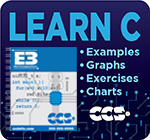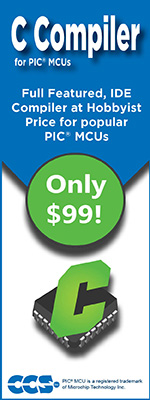Frequently Asked Questions
How does the compiler handle converting between bytes and words?
In an assignment such as:bytevar = wordvar;
The most significant BYTE is lost. This is the same result as:
bytevar = wordvar & 0xff;
The following will yield just the most significant BYTE: For Example:
bytevar = wordvar >> 8;
Any arithmetic or relational expression involving both bytes and words will perform word operations, and treat the bytes as words with the top byte 0. For example:
wordvar= 0x1234; bytevar= 0x34; if(wordvar==bytevar) //will be FALSE
Any arithmetic operations that only involve bytes will yield a byte result even when assigned to word.
bytevar1 = 0x80; bytevar2 = 0x04; wordvar = bytevar1 * bytevar2; //wordvar will be 0
However, typecasting may be used to force word arithmetic:
wordvar = (long) bytevar1 * (long) bytevar2; //wordvar will be 0x200





